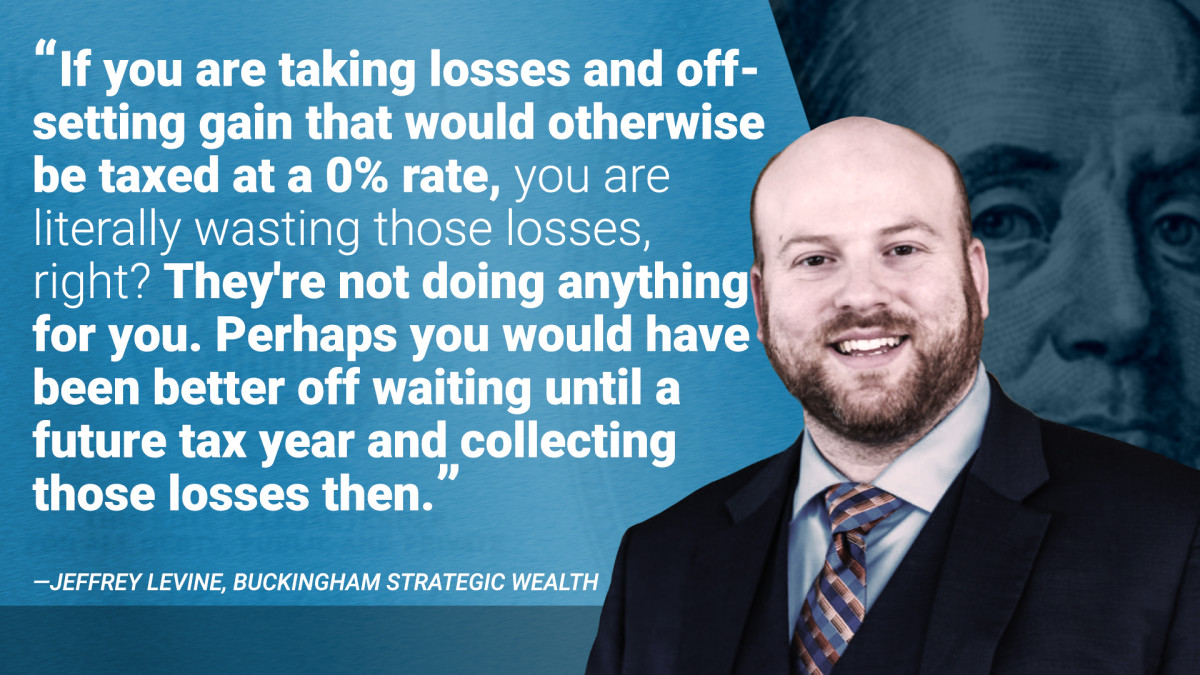There are many pros to tax-loss harvesting, allowing taxpayers to reduce the amount they owe during tax season. But, there are also times when tax-loss harvesting should be avoided.
Retirement Daily’s Robert Powell caught up with Jeffrey Levine, CPA and tax pro from Buckingham Strategic Wealth Partners, to answer the question.
TurboTax Live experts look out for you. Expert help your way: get help as you go, or hand your taxes off. You can talk live to tax experts online for unlimited answers and advice OR, have a dedicated tax expert do your taxes for you, so you can be confident in your tax return. Enjoy up to an additional $20 off when you get started with TurboTax Live.
Quotes| The Worse Time to Use Tax-Loss Harvesting Jeffrey Levine, Chief Planning Officer, Buckingham Strategic Wealth Jeffrey Levine, Chief Planning Officer, Buckingham Strategic WealthRecommended Read: Guide to Schedule D: Capital Gains and Losses
Video Transcript | Jeffrey Levine, CPA and Tax Expert, Buckingham Strategic WealthRobert Powell: Let’s talk about some taxes. When is tax-loss harvesting not a good idea?
Jeffrey Levine: So I think if I had to look at all the different times that it’s not a good idea, probably the single worst time to take capital losses would be when you’re offsetting capital gains that would be taxed at a 0% rate. There are some other situations where you might want to defer taking those capital losses, but if you are taking losses and offsetting gain that would otherwise be taxed at a 0% rate, you are literally wasting those losses, right? They’re not doing anything for you. Perhaps you would have been better off waiting until a future tax year and collecting those losses then. Now, of course, it’s true that if you wait until a future year, they may not be losses anymore. You may have an awful situation where your investments appreciate and you no longer have a loss. But in that case, at least you’ve enjoyed the appreciation of your investment. So of all the situations where I would be cautious about taking those losses to offset gain, it would be where that gain is taxed at a 0% rate. And as a reminder, the 0% long-term capital gains rate applies when individuals are in either the 10 or the 12% ordinary income bracket.
Recommended Read: What is the Wash Sale Rule?
Robert Powell: So is there any benefit to harvesting losses and just keeping them on the books in the chance that you’ll have capital gains that are above 0%?
Jeffrey Levine: Yeah, I think that’s valuable. The thing that you do have to be a little bit cognizant of is what is the future rate at which those losses will be used. But it’s also worth noting that if you have losses in excess of your capital gains, you can take up to $3,000 of those losses each year against ordinary income. And that might offset income tax as high as 37% on the federal rate today.
Editor’s Note: The content was reviewed for tax accuracy by a TurboTax CPA expert.
Zach Faulds contributed to the writing of this article and produced the video and/or the graphics associated with it.
